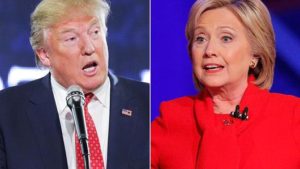Some months ago I mentioned to friends that I thought the 2016 election would produce a low-turnout result.
My friends laughed me out of the proverbial room. Why? They were certain that if the major-party presidential nominees were going to be Hillary Rodham Clinton and Donald J. Trump that they would energize their parties’ respective bases like no other candidate could do.
Well, here we are. Trump is the presumptive Republican nominee; Clinton hasn’t quite achieved presumptive status yet, but she’s going to be the Democratic nominee, just as she boasted the other day to CNN’s Chris Cuomo.
What do I think now about the turnout?
It’s going to be low. How do I know that? I don’t know it.
But the talk all around Pundit World centers on the high negative feelings that both candidates engender among voters. Trump polls about 70 percent unfavorable; Clinton’s unfavorable rating sits at around 60 percent.
The previous low-turnout record belongs to President Bill Clinton and U.S. Sen. Bob Dole, who ran against each other in 1996. Clinton won re-election that year with just 49 percent of eligible Americans actually voting that year. Clinton, of course, didn’t collect a majority that year, winning a healthy plurality, just as he did four years earlier; third-party candidate Ross Perot sucked enough votes away to deny the president a majority.
I have to agree with those who say that Clinton and Trump both are deeply wounded frontrunners. Trump’s failings are too numerous to mention; at every level one can mention, Trump is the most unfit major-party candidate ever to seek the presidency. Clinton’s been scrutinized carefully for more than two decades and she continues to suffer from this perception that she’s shifty and untrustworthy.
I’ve lost count of the number of times I’ve heard people say — either to me directly or to others — that they’re going to sit this one out. Republicans cannot vote for Clinton, even though they cannot stomach the idea of Trump carrying their party’s banner into battle.
Democrats aren’t going to walk the plank in favor of Trump.
Where do they turn? A third-party candidate still might emerge to capture the imagination of voters who are disgusted with the major parties’ selections.
If no one emerges, well, this election is looking as though it will set a dubious record for non-involvement.
Is that a mandate the winner will embrace?

On a recent Bill Maher show which featured a true heavy-hitter (Nick Gillespie) along with the articulate Ann Coulter, Dan Savage, and Bryan Cranston, Coulter averred that record numbers of voters had cast ballot in GOP primaries and suggested that many of these were former by-standers. The format of that show does not permit a sober recounting of sources – so it remains uncertain about “Trump-energized” voters and (more importantly) how that will play out in November.
I’ve often thought it would be interesting to get “new blood” in polling – with Soros-magnitude spending and truly broad sampling (none of that “likely voter” nonsense) – with focus on “swing states” and reporting by state. The swing-state bit has it’s own perils – perhaps as invalid as “likely voter” sampling and none of that “listed phone number” crap. A rigorous well-funded poll would sample all possible phone numbers using known “exchanges” – and a willingness to hit a lot of dead lines and un-answered calls.
(I would most likely never pick up a call from a pollster with a “strange” phone number)
Then there’s the veracity issue – white lies about one’s votes.
It seems that right-leaning voters are much more willing to lie about their votes or intentions to vote than left-leaning ones.
Enough of them were said to have so-swayed exit polling in the 2004 General Election – that seeming Kerry wins went in the end to Dubya.
With respect to voter behavior, I don’t see a great parallel between 2016 and 1996. 1996 was a prosperous year, well out of a mild recession, seemingly no enemies, “the end of history” as some put it – in other words not so much urgency to express personal frustration at the polls as ’08, ’12, and ’16.
I don’t see this adding up to a record low turnout.